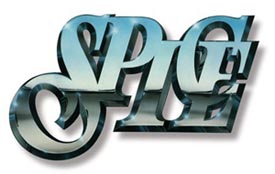
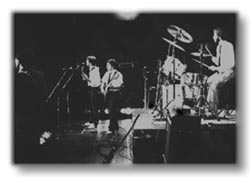
|
Profile
Eric McDow formed SPICE with Kevin Macmichael and Paul Eisan during the autumn of 1978. At first, a loosely knit combination of musicians who shared an interest in music recorded by The Beatles, the group performed at fraternity houses and on college campuses across the Maritimes. As the months went by, SPICE became more and more popular with the university crowd. Eventually, they came to the attention of Terris Panagiotakos who owned of the Misty Moon showbar in Halifax. In 1980, the Misty Moon was one of the largest nightclubs in Canada and featured premier Canadian and American recording acts. Perhaps sensing something in the air, Panagiotakos offered the trio an opening spot for Toronto bluesman, Jim Eaves, in January of 1980. The group was rather reluctant to perform three-piece in one of the nation's top venues, so Floyd King was recruited to make the lineup more complete. Both Kevin and Paul had worked with Floyd previously and his knowledge of the music made him the natural choice. The band's appearance at the Misty Moon was a smashing success. Less than a month later the group was asked back to perform at the club in a headline capacity. In the years that followed, SPICE performed dozens of shows throughout the Maritimes and became the biggest draw everywhere they played, including the 1500 seat Misty Moon. Sold out shows became routine and the crowds kept coming month after month. 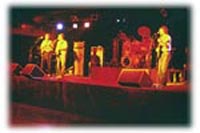 During a live performance, SPICE relied heavily on performing music from the Beatles' catalogue
but intentionally stayed away from the theatrics of Beatle tribute bands. Beatlemania, 1964, Rain
and Liverpool were all examples of groups that attempted to mimic the
Beatles in both appearance and song. From the outset the underlying philosophy
behind SPICE was to perform accurate and authentic renditions of Beatle songs with
a clear focus on capturing the energy and excitement that is so much a part of the music.
The importance of the Beatles in the history of popular recorded music cannot
be overstated. They appealed to millions by transforming rock & roll from
a rebel's yell and a lover's whisper into the most comprehensive music of
the twentieth century. Their succession of creative periods ended with the
elimination of the line that divided high art and popular entertainment.
It has been said that not liking the Beatles is as strange as not liking
the sun. Why did SPICE become so popular? Essentially, the group captured in
music the spirit of the world's best-loved band.
During a live performance, SPICE relied heavily on performing music from the Beatles' catalogue
but intentionally stayed away from the theatrics of Beatle tribute bands. Beatlemania, 1964, Rain
and Liverpool were all examples of groups that attempted to mimic the
Beatles in both appearance and song. From the outset the underlying philosophy
behind SPICE was to perform accurate and authentic renditions of Beatle songs with
a clear focus on capturing the energy and excitement that is so much a part of the music.
The importance of the Beatles in the history of popular recorded music cannot
be overstated. They appealed to millions by transforming rock & roll from
a rebel's yell and a lover's whisper into the most comprehensive music of
the twentieth century. Their succession of creative periods ended with the
elimination of the line that divided high art and popular entertainment.
It has been said that not liking the Beatles is as strange as not liking
the sun. Why did SPICE become so popular? Essentially, the group captured in
music the spirit of the world's best-loved band.
Not content to perform only Beatle music, SPICE always included a set of material that highlighted some of the classic record releases from the mid-sixties. Artists such as the Hollies, the Rolling Stones, Roy Orbison, Los Bravos, the Searchers, the Animals, the Rivieras, the McCoys, Del Shannon and the Kinks all helped to make up the catalogue SPICE drew from in a live show. The group's venture into the area of original music resulted in a number of singles entering the charts successfully. Beautiful You (Kevin), Prisoner of Love (Floyd), Hey Little Girl (Paul) and Give Me Money For Christmas (Floyd) are only a few of the originals which demonstrate that from the beginning SPICE was always never a mere cover band. The group's last project was to be a show that musically traced the Beatles story from the early days in Liverpool and Hamburg to the end of their career on a rooftop in London. The music would have been contrasted against the major events of the 1960s by means of audio and video clips. This two hour anthology was titled Off The Beatle Track. 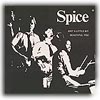 An evening with SPICE was always an evening of songs from one of the most important
decades in the history of popular music. From the Beatles' formative
years through to the period of Beatlemania, from the movies A Hard Day's Night and Help,
into the experimentation of the studio years and ending as the sixties draw to a close. All of this
music mixed with presentations of some of the biggest selling records from
the era of the British Invasion. This, along with the addition of some SPICE
originals, made for a great show as the group rolled back the years with a
positive and vibrant delivery of many of the greatest songs written during the twentieth century.
An evening with SPICE was always an evening of songs from one of the most important
decades in the history of popular music. From the Beatles' formative
years through to the period of Beatlemania, from the movies A Hard Day's Night and Help,
into the experimentation of the studio years and ending as the sixties draw to a close. All of this
music mixed with presentations of some of the biggest selling records from
the era of the British Invasion. This, along with the addition of some SPICE
originals, made for a great show as the group rolled back the years with a
positive and vibrant delivery of many of the greatest songs written during the twentieth century.
Kevin Macmichael - guitar / vocals 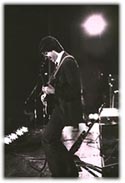 Kevin Macmichael worked steadily in the Maritime music scene before deciding to emigrate to England.
He left Canada in June of 1985 to form a band in London with British songwriter Nick Van Eede. The group was
called Cutting Crew and Broadcast, their debut album for Virgin Records, included the hit songs, (I Just) Died In Your Arms and
I've Been In Love Before. The former was the number one record in 19 countries around the world in 1987. For the
next three years Cutting Crew toured extensively throughout Europe, America and the Far East. The group was
nominated for a Grammy Award as Best New Artist and appeared on dozens of international television programmes,
including the UK's Top of the Pops and the Johnny Carson Show in the United States. As a member of Cutting Crew,
Kevin co-wrote and produced three more albums for Virgin Records: The Scattering (1988), Compus Mentus (1991) and
The Best of Cutting Crew (1992).
Kevin Macmichael worked steadily in the Maritime music scene before deciding to emigrate to England.
He left Canada in June of 1985 to form a band in London with British songwriter Nick Van Eede. The group was
called Cutting Crew and Broadcast, their debut album for Virgin Records, included the hit songs, (I Just) Died In Your Arms and
I've Been In Love Before. The former was the number one record in 19 countries around the world in 1987. For the
next three years Cutting Crew toured extensively throughout Europe, America and the Far East. The group was
nominated for a Grammy Award as Best New Artist and appeared on dozens of international television programmes,
including the UK's Top of the Pops and the Johnny Carson Show in the United States. As a member of Cutting Crew,
Kevin co-wrote and produced three more albums for Virgin Records: The Scattering (1988), Compus Mentus (1991) and
The Best of Cutting Crew (1992).
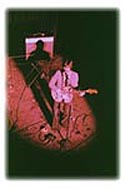 During 1992, Kevin was approached by former Led Zeppelin vocalist Robert Plant and Tears for Fears producer Chris Hughes
to collaborate on Plant's Fate Of Nations CD for Phonogram/Fontana. Kevin is featured as guitarist and co-writer on
the 1993 recording. With the release of Fate of Nations, Kevin became the musical director for Plant's touring band.
Their summer tour kicked off with dates in Prague, Budapest and Paris. The Robert Plant Band spent most of the summer
touring Europe as a double header with Lenny Kravitz. The Fate of Nations tour ended with an appearance at the Glastonbury
Festival with a sell-out crowd of more than 90,000.
During 1992, Kevin was approached by former Led Zeppelin vocalist Robert Plant and Tears for Fears producer Chris Hughes
to collaborate on Plant's Fate Of Nations CD for Phonogram/Fontana. Kevin is featured as guitarist and co-writer on
the 1993 recording. With the release of Fate of Nations, Kevin became the musical director for Plant's touring band.
Their summer tour kicked off with dates in Prague, Budapest and Paris. The Robert Plant Band spent most of the summer
touring Europe as a double header with Lenny Kravitz. The Fate of Nations tour ended with an appearance at the Glastonbury
Festival with a sell-out crowd of more than 90,000.
Toward the end of 1993 Kevin decided to leave Plant's band and was replaced by Jimmy Page. After almost nine years of working out of London, England, he chose to return to Canada. This was truly an opportunity to bring his song writing and production skills back to the industry and the region in which he developed much of the talent that took him around the world. Sadly, Kevin lost his battle with cancer on December 31, 2002. Paul Eisan - bass / vocals 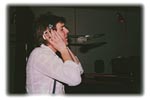 Paul Eisan has always been busy in the world of the performing arts. His amazing vocal talent brought him
to the attention of Neptune Theatre's directors and he was given a part in their production of Joseph and the
Amazing Technicolor Dreamcoat. When Theatre New Brunswick needed the services of a powerful vocalist, they too
turned to Paul for their production of John Gray's, 18 Wheels.
Paul Eisan has always been busy in the world of the performing arts. His amazing vocal talent brought him
to the attention of Neptune Theatre's directors and he was given a part in their production of Joseph and the
Amazing Technicolor Dreamcoat. When Theatre New Brunswick needed the services of a powerful vocalist, they too
turned to Paul for their production of John Gray's, 18 Wheels.
His first self-titled album release resulted in a mild regional hit with Mississippi born Jerry Butler's 1969 recording, Only The Strong Survive. The album was recorded as part of the Canadian Talent Library Series. In recognition of his tremendous natural talent he was asked by the producers of both Anne Murray and Roger Whitaker to take part in national television specials highlighting top Canadian artists. Paul has given live concert performances in Holland, Bermuda, Philadelphia, Baltimore, Boston and New York. 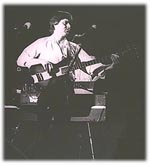 Paul's song writing abilities resulted in his collaboration with Terry Kelly on the recording, California Nights.
A spin-off of his ability to write songs was the development of a successful radio and television jingle career. His
voice can still be heard on many of the region's top advertising spots. He was selected by the television network,
MITV to write and perform the station's all new promotional spots which aired almost hourly for three years. The Toronto
based CHUM network asked Paul to sing in their 1992 campaign to strengthen Canadian unity. He performed the wonderful,
Christmas In Canada that year for audiences coast to coast.
Paul's song writing abilities resulted in his collaboration with Terry Kelly on the recording, California Nights.
A spin-off of his ability to write songs was the development of a successful radio and television jingle career. His
voice can still be heard on many of the region's top advertising spots. He was selected by the television network,
MITV to write and perform the station's all new promotional spots which aired almost hourly for three years. The Toronto
based CHUM network asked Paul to sing in their 1992 campaign to strengthen Canadian unity. He performed the wonderful,
Christmas In Canada that year for audiences coast to coast.
Most recently, Paul wrote and recorded the CD, After Forty Years, which reflects his deep interest in country music. Another direction for the multi-talented performer whose signature is the power of his voice and the quality of his art. Floyd King - guitar / vocals 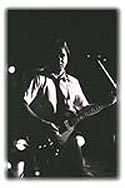 Floyd King has been involved in the music industry for almost thirty years. He is a seasoned veteran of the
Atlantic Canadian club circuit and a tremendously skilled songwriter. His song, Come Home To Nova Scotia, won out over
more than two hundred other submissions for selection as the theme in Nova Scotia's Old Home Summer campaign to increase
tourism to the province. The novelty song released with SPICE, Give Me Money For Christmas is still played each
holiday season more than fifteen years after it was recorded. He has appeared on radio and on television many times,
including spots on the Tommy Hunter Show and the Canadian Country Music Awards Show.
Floyd King has been involved in the music industry for almost thirty years. He is a seasoned veteran of the
Atlantic Canadian club circuit and a tremendously skilled songwriter. His song, Come Home To Nova Scotia, won out over
more than two hundred other submissions for selection as the theme in Nova Scotia's Old Home Summer campaign to increase
tourism to the province. The novelty song released with SPICE, Give Me Money For Christmas is still played each
holiday season more than fifteen years after it was recorded. He has appeared on radio and on television many times,
including spots on the Tommy Hunter Show and the Canadian Country Music Awards Show.
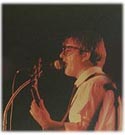 Song writing and production have always been the areas of the music industry that Floyd felt most content developing.
He often wears a producer's hat these days and his work producing and co-writing songs on Terry Kelly's Divided Highway CD
helped to win awards from the ECMA, the CCMA and from SOCAN in recent years. The production values that Floyd brought to
the Divided Highway project resulted in Terry Kelly being nominated to receive a Juno Award for Vocalist of the Year in 1995.
Song writing and production have always been the areas of the music industry that Floyd felt most content developing.
He often wears a producer's hat these days and his work producing and co-writing songs on Terry Kelly's Divided Highway CD
helped to win awards from the ECMA, the CCMA and from SOCAN in recent years. The production values that Floyd brought to
the Divided Highway project resulted in Terry Kelly being nominated to receive a Juno Award for Vocalist of the Year in 1995.
Continuing his collaboration with Terry Kelly, Floyd produced the majority of tracks on Terry's CD, Far Cry From Leaving. Floyd has performed across Canada, the United States and Australia and can occasionally be seen as the featured guitarist with Terry Kelly's touring band. Eric McDow - drums 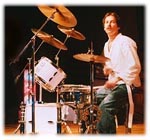 Eric McDow has always been focused on the business aspects of the music industry. From the beginning one of his
roles as a member of SPICE was to coordinate the performance dates for the
group. The contacts he developed over the years served as the foundation
to build a separate business centered around booking nightclub acts. Bands such as
Sam Moon, The Press, Kid Cadillac, Matt Minglewood, Domino, The Aviators,
Freeze and The Persuaders were only a few of the names Eric included on his
roster of artists throughout the 1980s.
Eric McDow has always been focused on the business aspects of the music industry. From the beginning one of his
roles as a member of SPICE was to coordinate the performance dates for the
group. The contacts he developed over the years served as the foundation
to build a separate business centered around booking nightclub acts. Bands such as
Sam Moon, The Press, Kid Cadillac, Matt Minglewood, Domino, The Aviators,
Freeze and The Persuaders were only a few of the names Eric included on his
roster of artists throughout the 1980s.
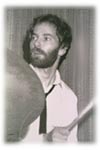 During the spring of 1989, Eric was approached by Vancouver producer Les
Vogt who had worked for many years with Roy Orbison and who had been
responsible for the Legends of Rock and Roll series at Expo '86 in Vancouver, British
Columbia. The affiliation licensed Eric to produce the Vancouver based
shows into eastern Canada, Quebec and New England. As the new decade approached, Eric developed the
performance series, Biography On Stage
and concentrated more and more on producing shows such as The Legends of Rock and Roll,
the award winning Elvis Elvis Elvis, Hank Williams: The Show He Never
Gave, Sweet Music Man: The Life and Music of Kenny Rogers, Bernard Purdie
Salutes The Platters and the Texas based presentation of The Roy Orbison Story. During September of 1997,
in a unique and truly ironic twist, Eric signed an agreement with Pete Best
to represent the former Beatle drummer for performance dates throughout North America.
During the spring of 1989, Eric was approached by Vancouver producer Les
Vogt who had worked for many years with Roy Orbison and who had been
responsible for the Legends of Rock and Roll series at Expo '86 in Vancouver, British
Columbia. The affiliation licensed Eric to produce the Vancouver based
shows into eastern Canada, Quebec and New England. As the new decade approached, Eric developed the
performance series, Biography On Stage
and concentrated more and more on producing shows such as The Legends of Rock and Roll,
the award winning Elvis Elvis Elvis, Hank Williams: The Show He Never
Gave, Sweet Music Man: The Life and Music of Kenny Rogers, Bernard Purdie
Salutes The Platters and the Texas based presentation of The Roy Orbison Story. During September of 1997,
in a unique and truly ironic twist, Eric signed an agreement with Pete Best
to represent the former Beatle drummer for performance dates throughout North America.
Today Eric is still busy developing and producing musical presentations into theatres and festivals worldwide. His last project, Behind The Beatles featured Pete Best on stage with Kevin, Paul and Floyd in a historically accurate narrative and musical retrospective of the evolution of pop music in England from the days of skiffle up through the British Invasion and makes fascinating use of The Beatles' formative years in Liverpool and Hamburg as a backdrop for the story. 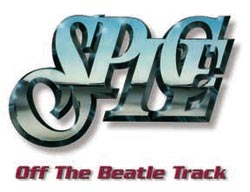

Liverpool, Hamburg and Beyond recorded May 18, 1961 John, Paul, George and Pete - Brian Epstein meets the Beatles Love Me Do recorded September 4, 1962 Beatles first single release peaked at #17 on the British charts 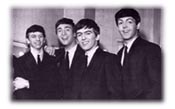 Please Please Me
Please Please Merecorded November 26, 1962 Beatles first U.K. #1 record, remaining #1 for two weeks in February 1963 From Me To You recorded March 5, 1963 Beatles third single enters the charts at #6 - reaches and stays #1 for five weeks I Saw Her Standing There recorded February 11, 1963 McCartney and Lennon wrote this song while playing hooky from school Please Mr. Postman recorded July 30, 1963 Cover version of the Marvelettes August 1961 hit record You've Really Got A Hold On Me recorded July 18, 1963 Cover version of the Miracles December 1962 hit record All My Loving recorded July 30, 1963 The first Beatles composition to become a standard I Want To Hold Your Hand recorded October 17, 1963 The first Beatles record to hit #1 in the United States, remaining #1 for seven weeks She Loves You recorded July 1, 1963 Written in a Newcastle hotel room - a signature song from the days of Beatlemania A Hard Day's Night recorded April 16, 1964 Title track from the Beatles first feature film - the original music video 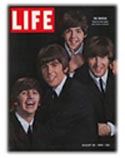 Can't Buy Me Love
Can't Buy Me Loverecorded January 29, 1964 Recorded at EMI Pathé Marconi Studios, Paris, France If I Fell recorded February 27, 1964 John Lennon's lyrics sold for $15,600.00 U.S. at Sotheby's, London in 1988 I Should Have Known Better recorded February 26, 1964 Part of the Beatles concert repertoire throughout 1964 No Reply recorded September 30, 1964 Beatles music publisher, Dick James, called this one of John Lennon's best songs I Feel Fine recorded October 18, 1964 First intentional use of feedback on a record intended for commercial release Help recorded April 13, 1965 Title track from the second film, originally called Eight Arms To Hold You I've Just Seen A Face recorded June 14, 1965 Originally called Auntie Gin's Theme after Paul McCartney's Aunt Gin Ticket To Ride recorded February 15, 1965 John Lennon stated that Paul's main contribution was the way Ringo played drums You're Going To Lose That Girl recorded February 19, 1965 Only two takes required to record one of the group's finest ballads Twist And Shout recorded February 11, 1963 The Beatles covered an Isley Brothers standard and made it a rock & roll classic intermission 
The Beatles ~ Unplugged recorded October 17, 1963 One of the four songs performed on the Beatles first Ed Sullivan Show appearance Yes It Is recorded February 16, 1965 It took just five hours to record what John Lennon called a rewrite of This Boy 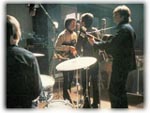 You've Got To Hide Your Love Away
You've Got To Hide Your Love Awayrecorded February 18, 1965 The first time the Beatles ever hired a session musician ( Johnnie Scott - flute ) Norwegian Wood ( This Bird Has Flown ) recorded October 12, 1965 Tuned to Western notes, the sitar was used for the first time on a Beatles song Girl recorded November 11, 1965 This song was written under pressure of a release deadline for the Rubber Soul album Yesterday recorded June 14, 1965 Over 2500 cover versions of this song make it the most recorded pop song of all time Taxman recorded April 20, 1966 British prime ministers Heath and Wilson are named in the stinging lyrics on taxation 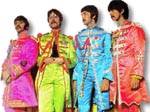 Got To Get You Into My Life
Got To Get You Into My Liferecorded April 7, 1966 The first Beatles song to use brass instruments Penny Lane recorded December 29, 1966 This was originally intended for a never-released album on the Beatles childhood Strawberry Fields Forever recorded November 24, 1966 Written in Almeria, Spain, the Central Park memorial to John Lennon is named Strawberry Fields All You Need Is Love recorded June 14, 1967 Recorded for the Our World satellite TV spectacular seen by over 400 million people Hello Goodbye recorded October 2, 1967 The BBC banned this song when McCartney was found to be lip-syncing in the TV promo film Lady Madonna recorded February 3, 1968 Melody and arrangement based on Humphrey Lyttleton Band's Bad Penny Blues from 1956 Blackbird recorded June 11, 1968 Inspired by newspaper accounts of the U.S. race riots in mid-1968 Two Of Us recorded January 31, 1969 Paul McCartney wrote this about himself and his wife, Linda Get Back recorded January 27, 1969 The Beatles pass the audition 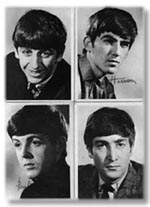

Ringo Starr You're Sixteen recorded May 14, 1973 George Harrison My Sweet Lord recorded June 6, 1970 Paul McCartney Band On The Run recorded September 22, 1973 John Lennon Imagine recorded July 9, 1971 1.800.200.7713 | Main | Entertainment | Management | Direction | Contact |
© Copyright 2015 AMERICAN NEWSREEL 1958 South Industrial, Ann Arbor, Michigan. 
|

